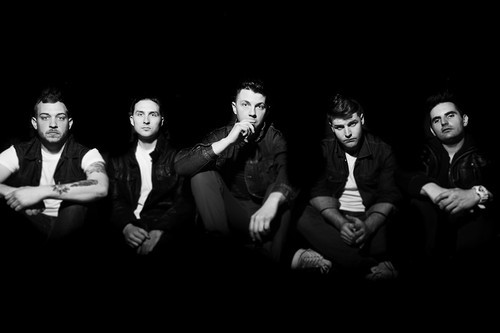
by Adrienne Fisher, edited by Erik van Rheenen
The night before Hostage Calm announced the release of their new record, they cryptically took to the Internet to tease the big news, tweeting/Instagramming out “One last time. Die on stage.” No context offered, no explanation provided – just the indication that something climatic was nigh. And the Internet, hungry as ever for drama, took this futile message to heart and began to speculate; this surely couldn’t mean the looming dissolution of the charming five-piece band from Connecticut, could it? Considering that Hostage hadn’t toured or even surfaced their heads in almost a full year, it was all too easy to jump to the conclusion that a lack of activity, combined with the “one last time” declaration, was a sign of the band’s demise. But as it turns out, the mantra behind Die on Stage isn’t as much a death rattle as it is the core of their artistic expression, the centerpiece of the Hostage Calm spirit, and moreover, the complete opposite of an imminent breakup.
“The ethic behind Die On Stage is one of giving yourself to the art,” vocalist/songwriter Chris Martin explained in a recent phone interview. “The concept of that first word, ‘die,’ is that death is the finale of effort. It’s the last time, the last of your material existence, the last of your life’s big push. And then after you’re done, whether it’s a band or a human or a relationship, all that survives of it is the memory. And that legacy is what we are constantly chasing, the concept that we would go and make art so bold, so powerful, and so singular that it could live on long after we do.”
Die On Stage is Hostage Calm’s fourth studio LP and the follow-up to 2012’s acclaimed Please Remain Calm, a record that was pointedly focused on bringing forward the unspoken disillusionment and heartbreak of American youth amidst the economic downturn. An enduring portrait of the times told through thoughtful, contemplative metaphors and propped up by a lively kaleidoscope of vintage rock n’ roll influences, PRC pulled the curtain back to reveal the widespread societal unrest of an entire generation. But if PRC strived to converse about the embittered attitudes of American youth at large, the stories told on Die On Stage zoom in on a much smaller microcosm of that unrest by depicting the daily manifestations of it. “On a lot of the songs, there’s this sense of carpe diem, of shedding the chains of subdued social life and not being afraid to do what you want,” Martin pointed out. “But other parts of the record are terrified, and they feel guilt, and there’s this sense of disillusionment. Both are very much at work. And that’s something that I think connects with as many people, if not more, than the nuanced political speak that flows more heavily across some of our prior records.”
The idea of having enough self-awareness to recognize a morally depraved world and pairing it with taking advantage of early adulthood’s messy freedom is one that’s deeply explored on the LP. Through digging into the day-to-day consciousness of such contemporary life, Die On Stage exalts the highs and lows of human experience in a way that doesn’t demand closure or a moral to the story, but instead allies itself with the brutal honesty of real, onerous self-reflection. Coming on the heels of a breakup, many of Martin’s lyrics allude to trying to navigate and contextualize interpersonal relationships in light of a newfound thirst for life as a single dude, but not without experiencing and even honoring his palpable sense of guilt, as, for example, he sings on “A Thousand Miles Away From Here” – I’m dying, you’re living with my reckless decisions, unwanted, unforgiven. The emotions conveyed all over the album are those born of extremity, and without resolution – but they’d rather celebrate than languish the tumult that comes with creating the legend of your own life.
So while Die On Stage may not be making overt political references to the Arab Spring or the fight for marriage equality, Martin hopes to continue having conversations on individual and societal levels about the state of the political landscape and how it informs everyday life and attitudes. By offering his own not-always-happy stories of his modern American experience, one of the objectives is to challenge people to truly engage with their personal realities and not the unreasonable pretenses that are handed to or expected of them. “If we can talk about what it really feels like to be young and alive right now, and to tie that into the greater travails of our society’s past, present, and future, then I think that we’re capable of seeing even broader social change around us,” said Martin. “That individual, ground level engagement is what builds change and understanding, and that’s why I see Die On Stage as just as socially ambitious and politically minded as any record we’ve ever made, and probably more so.”
It takes a tight-knit operation to create a body of work that’s capable of accomplishing such lofty goals, and after seven years and four LPs together, Hostage has honed their talent and purpose to become more musically cohesive than they’ve ever sounded. You needn’t look any further than the catharsis that ties all the corners of Die On Stage together to know just how in sync the band members are with one another. “We all share this enormity of purpose and have stayed with each other in the various changes of our lives and our artistic growths,” Martin said of his bandmates. “I wish I had an explanation for why that’s happened, but that’s the great mystery for how you find someone or something you love.”
You know what they say…if we die on stage, we die on stage together. Luckily, Hostage Calm have got way more to say about dying on stage than a terrible pun ever could.
